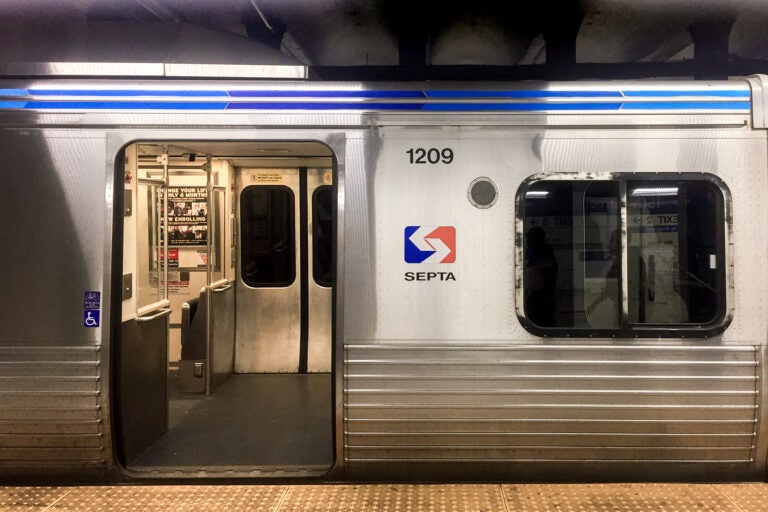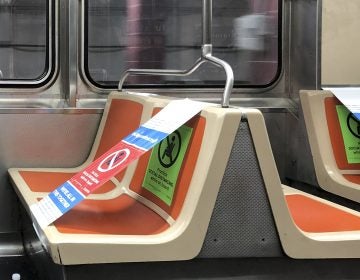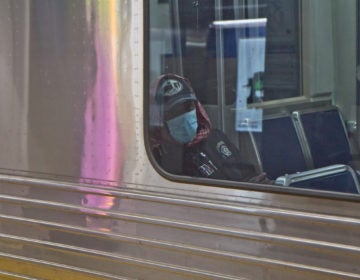Transit union calls out SEPTA for ‘Scrooge-like’ quarantine policy
If a SEPTA employee needs to quarantine a third time, they must use their own sick leave and benefits that provide 50% of their pay.

An empty SEPTA train car. (Anna Orso/Billy Penn)
Ask us about COVID-19: What questions do you have about the current surge?
SEPTA transit union TWU Local 234 says the authority is endangering riders and its workforce with a policy that disincentivizes workers from staying home to quarantine more than two times.
SEPTA transit workers can receive up to 160 hours in paid time off for two 14-day quarantines. However, if a worker needs to quarantine a third time, they must use their own sick leave and benefits that provide 50% of their pay.
TWU officials say some workers have already had to quarantine two times during the pandemic and call the policy “Scrooge-like” and “short-sighted.” They argue that workers who have exhausted their fully-paid quarantine leave or who are struggling financially may feel they have no choice other than to return to work, which could put riders and other workers at risk.
“If a person’s sick that person should not come to work,” said union president Willie Brown. “This is nothing to play with.”
The coronavirus pandemic has impacted SEPTA’s workforce by infecting a reported 842 people as of Dec 21, with nine employees who have died due to COVID-19. Four-hundred and sixty-eight people have returned to work after recovering from the virus since the start of the pandemic.
SEPTA spokesperson Andrew Busch said worker absences are at about 600 per day. During the spring wave of the pandemic that number was at about 1,000 or more. Pre-pandemic absences were in the range of 350 to 400.
Assistant General Manager for Public and Government Affairs Fran Kelly said the authority is working on getting transit workers “moved up in the vaccine schedule.”
“We’re looking at doing the best we can to protect our riders, but especially our workers,” Kelly said.
SEPTA Assistant General Manager for Operations Scott Sauer says, “at this time we’re not making any adjustments” to the quarantine policy, and that less than 100 workers have used all 160 hours offered.
The union also issued a letter to the SEPTA board requesting the agency implement or reinstate COVID safety protocols such as stepped-up sanitization, contact tracing, and a less “rigid” child care leave policy.
“This virus is a question mark,” said union president Brown. “There’s no guarantees with this. So, nobody wants to be around this or be involved with it.”
The union said it’s exploring legal action against the authority over possible civil rights violations. Brown assured that another case is in the works on behalf of the families of transit workers who have died and have not received additional benefits.
Such cases could result in a financial blow to the authority during a precarious time.
“We definitely do not want to waste valuable resources on that and I hope that’s the last thing that it comes to [and] that we come together in good faith,” Kelly said.
SEPTA officials estimate a daily loss of $1 million at the farebox with about 30% ridership throughout the system. They received $643 million from the first COVID relief package back in spring, but that money is only expected to last through the end of next year.
Federal officials recently passed a COVID relief bill that allocates $14 billion to transit agencies nationwide. Authority officials are still “trying to figure out … what we’ll see,” said Kelly, but “it’s much needed.”
“We’re trying to walk a tightrope here with financial stability, of making sure that we’re standing in 12-18 months, too,” Kelly said.
 WHYY is one of over 20 news organizations producing Broke in Philly, a collaborative reporting project on solutions to poverty and the city’s push towards economic justice. Follow us at @BrokeInPhilly.
WHYY is one of over 20 news organizations producing Broke in Philly, a collaborative reporting project on solutions to poverty and the city’s push towards economic justice. Follow us at @BrokeInPhilly.

Subscribe to PlanPhilly
WHYY is your source for fact-based, in-depth journalism and information. As a nonprofit organization, we rely on financial support from readers like you. Please give today.





![CoronavirusPandemic_1024x512[1]](https://whyy.org/wp-content/uploads/2020/03/CoronavirusPandemic_1024x5121-300x150.jpg)



